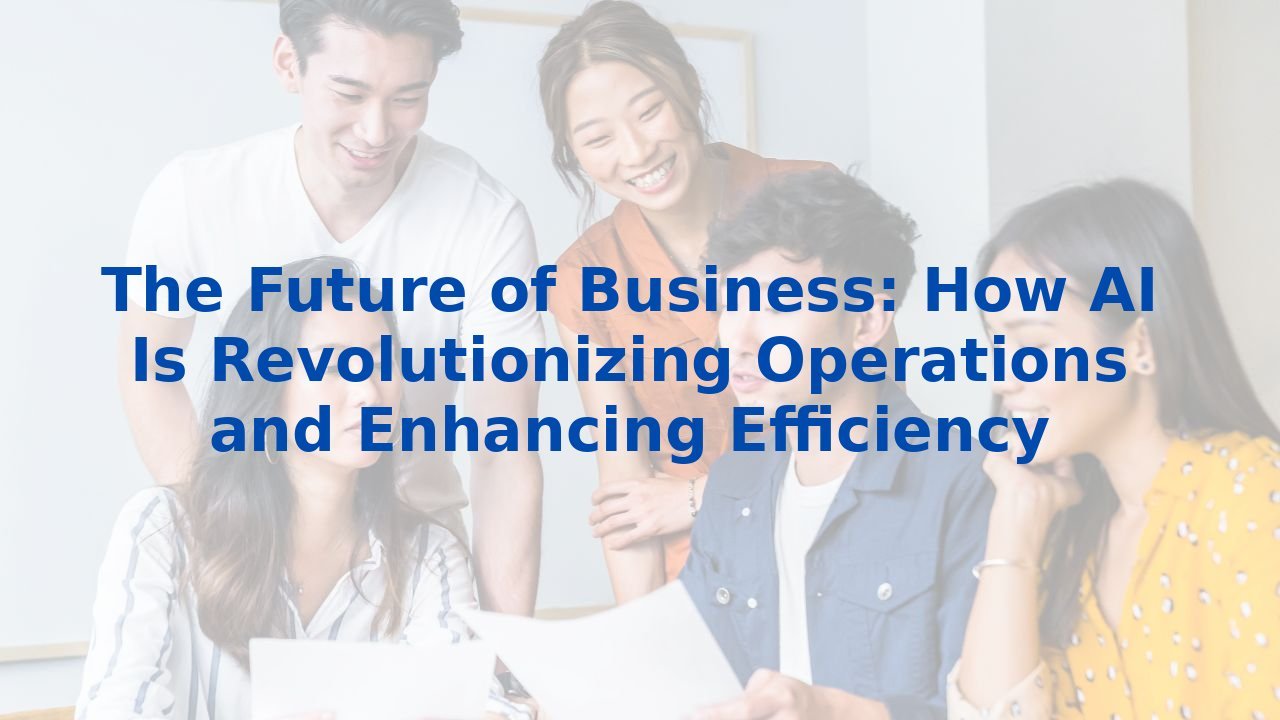The Future of Business: How AI Is Revolutionizing Operations and Enhancing Efficiency
The Future of Business: How AI Is Revolutionizing Operations and Enhancing Efficiency
We are living in an era where the pace of technological advancement is reshaping the landscape of business as we know it. At the forefront of this change is Artificial Intelligence (AI), a transformative force that is redefining organizational processes and amplifying operational efficiency. More than just a trend, AI represents a foundational shift in how companies operate, from the intricacies of administrative tasks to the nuances of hiring practices. Let’s delve into the myriad ways AI is impacting modern business and discover how it can enhance efficiency within organizations.
1. Rethinking Administrative Duties
Administrative tasks often eat away at productivity, with managers reportedly dedicating more than half of their work hours to activities like report drafting and scheduling conflicts. Enter AI, the game-changer that streamlines these processes by automating repetitive tasks. In industries like manufacturing, for example, AI can detect product defects and eliminate them from the production line, not only saving time but also enhancing product quality. With AI taking the reins on administrative duties, businesses can significantly reduce the risk of human error and free up valuable time for their leaders to focus on strategic initiatives.
2. Transforming Hiring Practices
Hiring is often a laborious process laden with repetitive tasks. AI technologies are revolutionizing this aspect by enabling human resources departments to operate more efficiently. Intelligent software can rapidly filter through job applications to identify the most promising candidates, dramatically shortening the time it takes to fill roles. Moreover, AI-driven simulations assess applicants’ personalities and cultural fit, ensuring that businesses identify individuals who resonate with their core values. In this way, AI not only speeds up the hiring process but also enhances the quality of hires, setting the stage for a more cohesive team.
3. Redefining Job Roles
As the capabilities of AI continue to evolve, so too does the nature of work. Business leaders are beginning to revise job roles rather than eliminate them altogether. This thoughtful restructuring encourages companies to evaluate which functions can be automated and which require human touch. For instance, in customer service, AI can resolve common issues before they become problematic, allowing human representatives to focus on more complex customer needs. This shift not only increases job satisfaction for employees but also enhances the overall customer experience.
4. Enhancing Workplace Efficiency
AI serves as a powerful ally in navigating the complexities of workplace operations. Here are three critical ways in which AI promotes enhanced efficiency:
- Data Visualization and KPI Tracking: AI can analyze vast volumes of data and transform them into intuitive visualizations. Teams can make informed decisions quickly, based on clear, actionable insights.
- Consumer Behavior Insights: By dissecting customer data, AI provides vital insights that help companies intervene at optimal moments, reducing churn and enhancing sales opportunities.
- Maximizing Human Talent: With AI handling routine tasks, data experts can shift their focus to more strategic work, unlocking new opportunities for innovation and resource allocation.
The Multifaceted Benefits of AI
The benefits of integrating AI into business operations are multifold:
- Increased Efficiency: By automating repetitive tasks, AI allows businesses to respond promptly to customer inquiries and service demands, while also reducing the risk of errors associated with manual processes.
- Empowered Decision-Making: AI’s ability to sift through enormous datasets uncovers insights that are vital for informed decision-making in various operational areas, from demand forecasting to supply chain management.
- Enhanced Customer Support: AI chatbots and virtual assistants efficiently manage tasks like email responses and appointment scheduling, improving customer interactions while allowing employees to engage in higher-impact activities.
The Importance of Employee Training for AI
As organizations harness the power of AI, investing in training employees to work alongside these advanced technologies becomes crucial. Here’s why:
- Improved Collaboration: Training enhances the collaboration between humans and AI, ensuring that employees can leverage AI’s analytical capabilities to maximize outcomes.
- Workforce Upskilling: Equipping employees with AI skills prepares them for roles that complement AI technologies, minimizing job displacement risks while fostering an adaptive workforce.
In conclusion, the future of business is inextricably linked to the capabilities of AI. From simplifying administrative tasks and refining hiring processes to redefining job roles and maximizing workplace efficiency, AI is a pivotal element in driving organizational success. Additionally, prioritizing employee training will ensure that staff members can thrive in this new landscape, ultimately allowing businesses to harness the full potential of artificial intelligence.
To explore how training your workforce for AI can drive efficiency in your organization, check out Complete AI Training. The journey into the AI revolution starts with preparation, insight, and a willingness to adapt.



